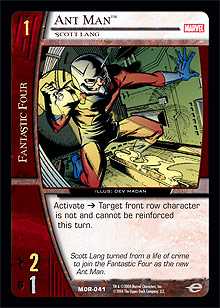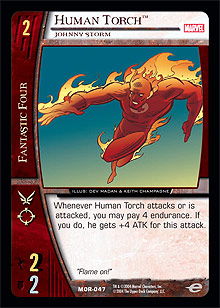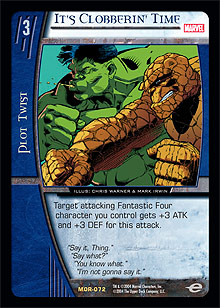
It had to happen. There was no possible way that Fantastic Four week could go from start to finish without somebody making a pun on the team moniker. With Overload now conveniently out of the way in Golden Age, it looks quite likely that beatdown will be an increasingly important element of the metagame.
 Picture the following situation. It really happened in the final round of a $10K in which my opponent and I were playing for a money finish. My opponent won the coin flip and kept his opening hand with a wry smile—not what you want to see when playing for money. His first turn recruit was Ant-Man, Scott Lang, who for some reason decided to hang back in the support row. For my sins, I had not a single character to put in his way; not that I was especially worried, as without range, the insect was far from a concern as he cowered next to the lone resource that my opponent had on the board. A Mega-Blast and a Flying Kick later, I was left languishing on 41 endurance with a rather bemused look on my face.
Picture the following situation. It really happened in the final round of a $10K in which my opponent and I were playing for a money finish. My opponent won the coin flip and kept his opening hand with a wry smile—not what you want to see when playing for money. His first turn recruit was Ant-Man, Scott Lang, who for some reason decided to hang back in the support row. For my sins, I had not a single character to put in his way; not that I was especially worried, as without range, the insect was far from a concern as he cowered next to the lone resource that my opponent had on the board. A Mega-Blast and a Flying Kick later, I was left languishing on 41 endurance with a rather bemused look on my face.
Unfortunately for my opponent, his horrendously aggressive start was rather blunted in later turns as Overload, Nimrod, and Bastion decided to return the beatdown favors with a little interest. Still, I was nonetheless rattled by the brutal beatings that came from a team whose potential to mix it up in a fight is sometimes overshadowed by the “family unit” feel of Reed, Sue, Johnny, and Ben righting wrongs in matching spandex.
Now that the potential for being punished for super-sizing one’s characters has been eliminated from Golden Age, we find ourselves with a rather entertainingly inaccurately named format; for a few weeks at least, Golden Age will be fresh and new, and the best deck will be far from clear. Personally, I think that being the living embodiment of “the beatdown” might well be the way forward, and the Fantastic Four have all the tools for this.
In essence, a good beatdown deck is just taking the most direct route to reducing one’s opponent to 0 endurance—a noble goal. Often, the direct approach gets looked down upon by players doing something a little more “tricksy,” but every now and then, applying Occam’s Razor* is appropriate in Vs. System. While a combo or control deck might well have to think many turns ahead in terms of using its search effects appropriately or finding the most effective time to use its tricks, beatdown decks have their own challenges. First and foremost, as beatdown decks tend to have the most active combat steps, appropriate formation is more important for beatdown decks than for any others.
Fantastic Four-play
Thinking turns ahead is all very well, but the formation step forces every player to think a couple of phases ahead to the combat step. Depending on the initiative, beatdown decks will either be looking to attack for the greatest possible amount of endurance loss (without knowing what is coming from an opponent’s recruit step), or to ensure minimal losses while maximizing the ability to attack back. They will typically have more characters in play looking to get involved in a fight than most, and with each extra character, the options multiply, leaving more potential for mistakes.
 The Fantastic Four have two real advantages in terms of straightforward beatdown. Firstly, they have characters that are “conveniently large.” There is nothing more disheartening than facing combat steps in which it isn’t possible to attack a character of the same cost without some sort of trick. Human Torch, Johnny Storm and Luke Cage, Hero for Hire have a nasty habit of attacking characters with higher costs than their own and successfully taking them down a peg or two, and the trouble just carries on all the way up the curve. The size of the Fantastic Four’s characters works double duty in that on defense, decisions for opponents are that little bit harder. Each point of DEF for a character is crucial in beatdown matches, as it in effect puts you ahead of the endurance loss differential by soaking up a little more damage.
The Fantastic Four have two real advantages in terms of straightforward beatdown. Firstly, they have characters that are “conveniently large.” There is nothing more disheartening than facing combat steps in which it isn’t possible to attack a character of the same cost without some sort of trick. Human Torch, Johnny Storm and Luke Cage, Hero for Hire have a nasty habit of attacking characters with higher costs than their own and successfully taking them down a peg or two, and the trouble just carries on all the way up the curve. The size of the Fantastic Four’s characters works double duty in that on defense, decisions for opponents are that little bit harder. Each point of DEF for a character is crucial in beatdown matches, as it in effect puts you ahead of the endurance loss differential by soaking up a little more damage.
Fantastic Rein-four-cement
This defensive element is actually surprisingly important in beatdown decks. It is reasonable to assume these days that whenever one plays against another one, each can potentially have a whole mess of ATK-pumping plot twists that are more than able to cause problems for your standard defensive tricks. Reinforcement is more important than ever, and the Fantastic Four have a great deal of potential to dole it out. Invisible Woman, Sue Storm is hardly the most aggressive of characters, but she certainly makes life tricky for opponents who are forced to deal with her first in any combat step if they ever want to do any reasonable amount of breakthrough. Sue’s defensive leanings stretch further than just her handy dandy ability, though. With Mr. Fantastic, Stretch out, Personal Force Field can do a similar job, and Catcher’s Mitt is also pretty painless when it comes for free. Looking to the new starter decks, Force Shield can create some tricky situations when combined with a character sitting front and center with some Kevlar Body Armor, which is another potent addition to the Four’s trick bag.
Fantastic Four-mation
This extra reinforcement allows one to start making more openly aggressive formations, as protection of characters is only necessary to limit your opponent’s options and not to keep yours open. Indeed, if making your opponent’s options tougher is your goal, then Coast City is a powerful choice. While the synergy between Hal Jordan’s hometown and Invisible Woman, Sue Storm is hardly as strong as that with Sinestro, Green Lantern of Korugar, it can force some tricky attacks from opposing beatdown decks if they want to get any real damage in. Anything that makes your opponent’s life harder is likely to make yours that little bit easier.
Were I going to a Golden Age $10K anytime soon**, this list would be pretty close to the beatdown deck that I’d take.
Fantastic Force
Characters
 4 Ant Man, Scott Lang
4 Ant Man, Scott Lang
4 Luke Cage, Hero for Hire
3 Human Torch, Johnny Storm
4 Thing, Ben Grimm
3 She-Hulk, Jennifer Walters
4 Invisible Woman, Sue Storm
4 Mr. Fantastic Stretch
3 Hulk, New Fantastic Four
2 Thing, The Ever Lovin’ Blue-Eyed Thing
2 Silver Surfer
Plot Twists
4 Signal Flare
4 Savage Beatdown
4 It’s Clobberin' Time!
3 Flying Kick
3 Unmasked
3 Tech Upgrade
Equipment
2 Personal Force Field
1 War Wagon
3 Fantasticar
The inclusion of Unmasked is a little piece of tech that originates from Italy and $10K Vienna winner Matteo Paolucci, whose Fantastic Four beatdown deck smashed me on its way to victory. Not only does it spell all sorts of trouble for Big Brotherhood decks, it can also be surprisingly annoying for many other opponents; Red Star is decidedly less threatening from Teen Titans, and Sentinels has to use its Reconstruction Programs in a slightly more honest fashion. War Wagon is there to hammer home whatever board advantage can be gained by having such big threats, and it can do a lot of damage with Stretch about. Depending on how people view the metagame, there is potential to do naughty things with Kevlar Body Armor and Mr. Fantastic, Scientific Genius, or perhaps to use Lanterns in Love to surprisingly recover characters to keep board position. These finer details are really up to the player, but let no player doubt—the Fantastic Four are definitely big threats in the new undefined metagame of Golden Age.
Have fun and be lucky!
Tim “Hopes that the Invisible Woman isn’t Invisible for Too Much of the Film” Willoughby
timwilloughby (at) hotmail.com
* A great little idea put forward in the fourteenth century by a clever Englishman that basically suggests that the simplest explanation is probably the best one. The really clever thing about Occam, though, was that he was the first person to think to write it down, and as such, was immortalized forever as a great thinker. This is why you should always give your decks great names; that way you can be immortalized, too.
** As it happens, I am going to a Golden Age $10K relatively soon—$10K Munich, which is on the weekend of the 16th and 17th—but I’ll be there as a reporter and not as a player.